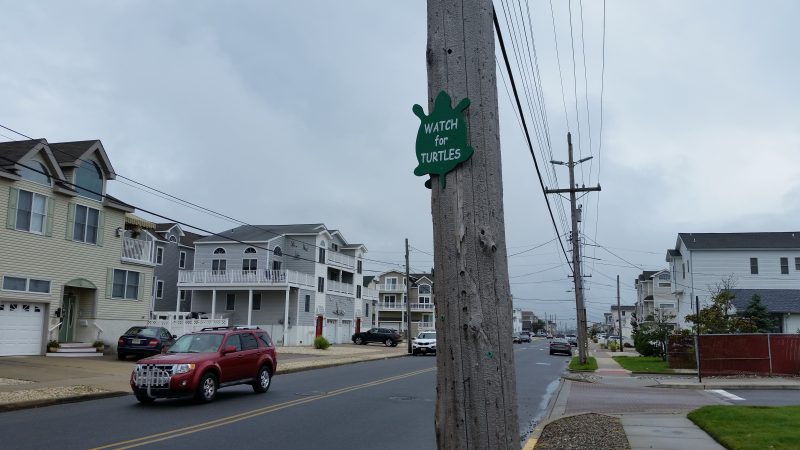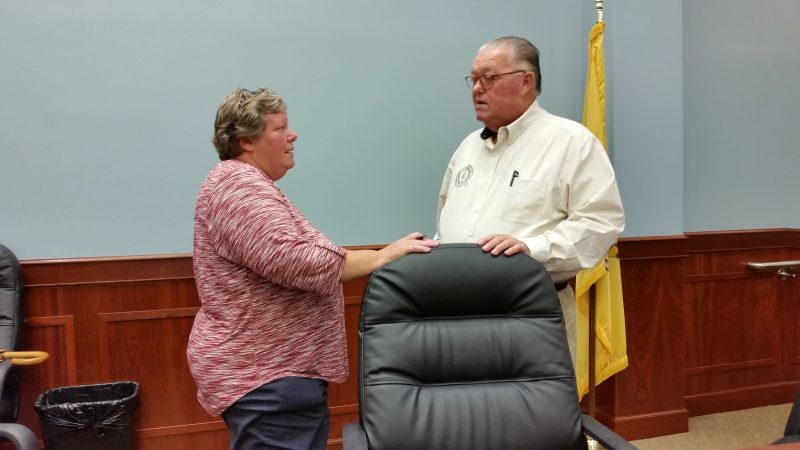Councilman J.B. Feeley, talking to Councilwoman Mary Tighe, wants a complete smoking ban on Sea Isle's beaches.
 By Donald Wittkowski
By Donald Wittkowski Council members Mary Tighe and J.B. Feeley both spoke about the dangers to sea life from deflated balloons.
Once they fall into the ocean or bays, the deflated plastic balloons are often mistaken as food. Turtles and other sea creatures think the shiny balloons are jellyfish and try to eat them, which can block their digestive systems and cause them to starve to death.
“We all see the turtles and fish that swallow these things,” Council President Mary Tighe said.
Tighe and Councilman Frank Edwardi joined with Feeley in signaling their support for an ordinance to ban mass balloon releases. Edwardi called it a “good idea.” No Council members raised objections.
The U.S. Fish & Wildlife Service has warned the public about the harm balloons can do to the environment. On its website, the agency tells the public: “Please don’t release your balloons.”
“Balloons are great at birthdays, weddings, graduations and more, but once they get loose, balloons can pose a threat to many animals,” the Fish & Wildlife Service says.
Birds can become entangled in the ribbons or strings attached to balloons, similar to the way they are snarled in discarded fishing line. Deflated balloons can also end up as litter, clogging bird nets or covering the birds themselves, including the chicks, according to the Surfrider Foundation, an environmental group that has been lobbying shore towns to ban balloon launches.
Feeley said Sea Isle should join other neighboring towns that have adopted ordinances prohibiting the mass release of balloons.
In Cape May County, Avalon and Cape May ban balloon launches, while Stone Harbor is in the midst of adopting a similar ordinance, Feeley said. In Atlantic County, towns banning the mass release of balloons include Atlantic City, Longport, Margate, Ventnor and Somers Point.
Ocean City discussed the possibility of banning balloon launches this year, but instead settled on a public awareness campaign headed by the town’s Environmental Commission to warn of the dangers to turtles and other sea life.
The Environmental Commission has printed a one-page fact sheet headlined with the words, “Balloons can kill wildlife!” It includes photos of animals that died after they ate balloons or became entangled in the string.
In the meantime, Ocean City has taken other steps to protect the environment by discouraging the use of balloons during one of its major tourist attractions, the annual Night in Venice boat parade.
Night in Venice contestants are instructed in an application form not to use balloons to decorate their homes or boats, according to city spokesman Doug Bergen.
Council members Mary Tighe and J.B. Feeley both spoke about the dangers to sea life from deflated balloons.
Once they fall into the ocean or bays, the deflated plastic balloons are often mistaken as food. Turtles and other sea creatures think the shiny balloons are jellyfish and try to eat them, which can block their digestive systems and cause them to starve to death.
“We all see the turtles and fish that swallow these things,” Council President Mary Tighe said.
Tighe and Councilman Frank Edwardi joined with Feeley in signaling their support for an ordinance to ban mass balloon releases. Edwardi called it a “good idea.” No Council members raised objections.
The U.S. Fish & Wildlife Service has warned the public about the harm balloons can do to the environment. On its website, the agency tells the public: “Please don’t release your balloons.”
“Balloons are great at birthdays, weddings, graduations and more, but once they get loose, balloons can pose a threat to many animals,” the Fish & Wildlife Service says.
Birds can become entangled in the ribbons or strings attached to balloons, similar to the way they are snarled in discarded fishing line. Deflated balloons can also end up as litter, clogging bird nets or covering the birds themselves, including the chicks, according to the Surfrider Foundation, an environmental group that has been lobbying shore towns to ban balloon launches.
Feeley said Sea Isle should join other neighboring towns that have adopted ordinances prohibiting the mass release of balloons.
In Cape May County, Avalon and Cape May ban balloon launches, while Stone Harbor is in the midst of adopting a similar ordinance, Feeley said. In Atlantic County, towns banning the mass release of balloons include Atlantic City, Longport, Margate, Ventnor and Somers Point.
Ocean City discussed the possibility of banning balloon launches this year, but instead settled on a public awareness campaign headed by the town’s Environmental Commission to warn of the dangers to turtles and other sea life.
The Environmental Commission has printed a one-page fact sheet headlined with the words, “Balloons can kill wildlife!” It includes photos of animals that died after they ate balloons or became entangled in the string.
In the meantime, Ocean City has taken other steps to protect the environment by discouraging the use of balloons during one of its major tourist attractions, the annual Night in Venice boat parade.
Night in Venice contestants are instructed in an application form not to use balloons to decorate their homes or boats, according to city spokesman Doug Bergen.